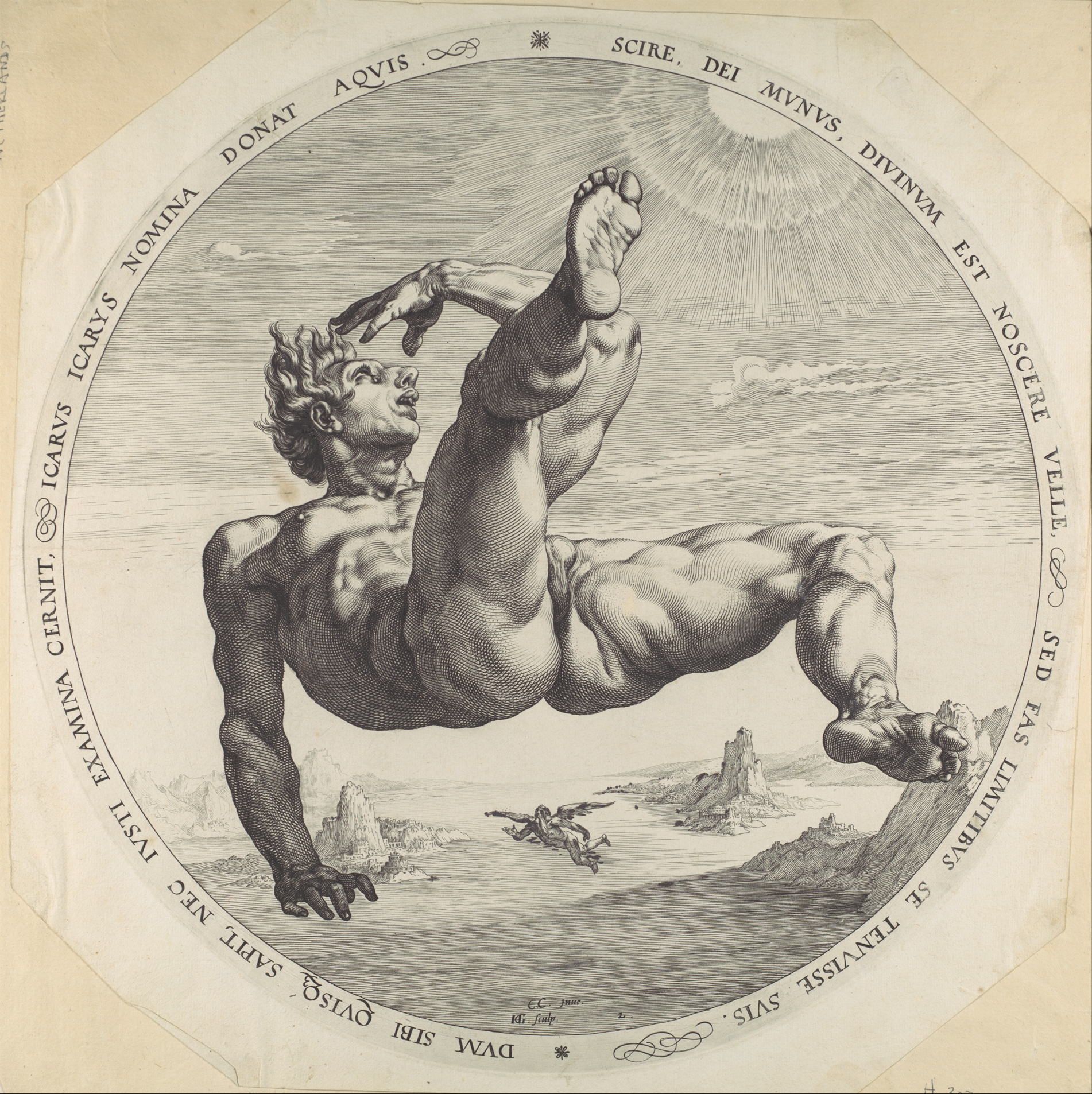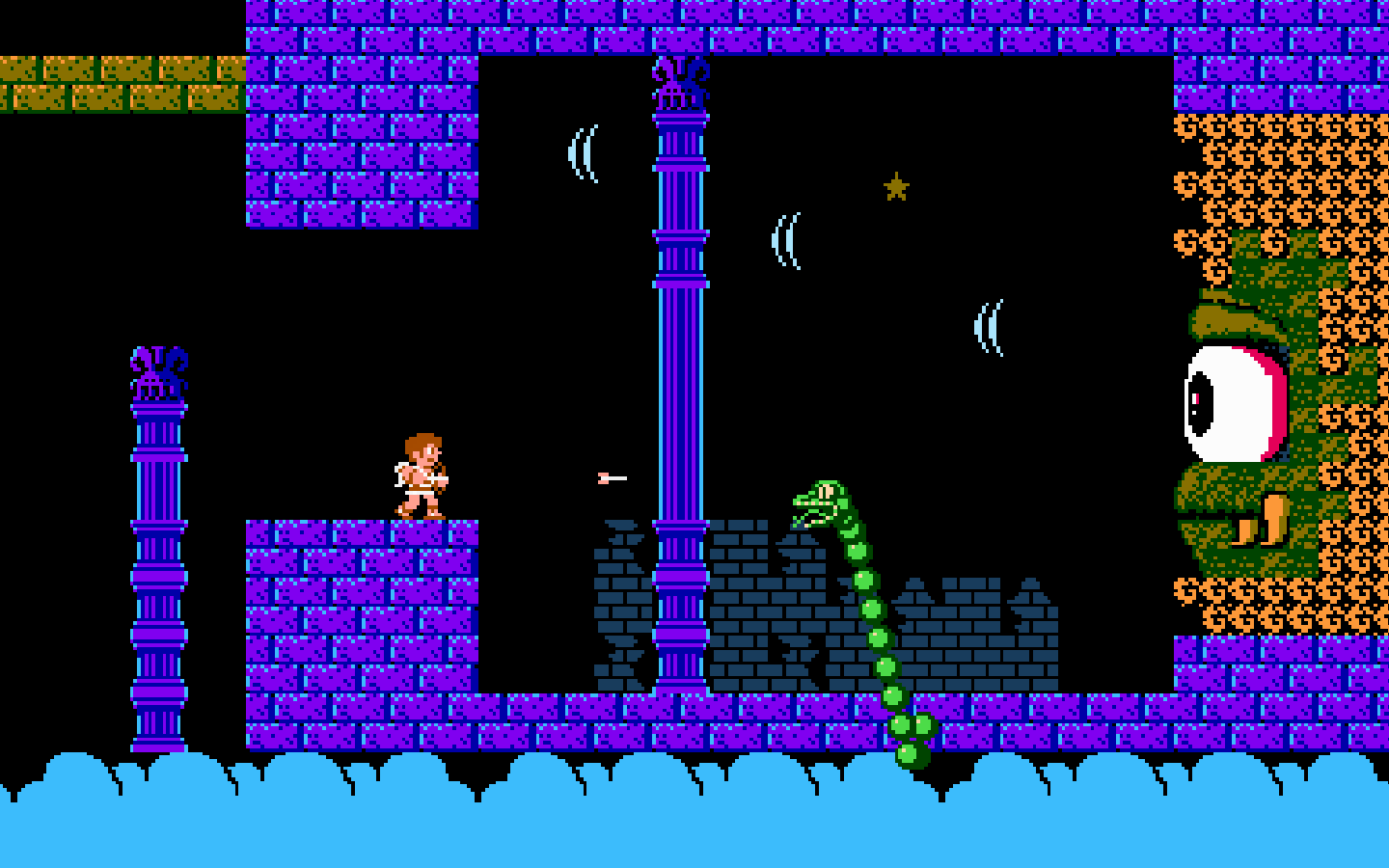|
|
| "Icarus", Henri Matisse |
Visualizing the Story of Icarus in Art

|
|
Image source: Icarus (from the Four Disgracers) Hendrick Goltzius, 1588.
|
At the Metropolitan Museum of Art in New York City, one can see Hendrick Goltzius’s engraving of the tale (from an ignominiously titled series “The Four Disgracers”). Goltzius’s Icarus depicts a monstrous-looking body plummeting to its death (which the viewer witnesses in a neat trick of visual toe-on perspective). This Icarus looks up at the sun, his hair blown wild, and his face a contorted mix of rage and regret. His body is massive, too much weight to bear in the air. His rage is palpable – directed towards the sun as if the sun is a villain. Yet looking closely at the details of the engraving, the viewer sees Icarus forever fixed in this position, as if he is similar to Sisyphus who rolls the rock to the mountaintop only for it to fall back down again. We see Sisyphus at the top, almost there, almost victorious, and we freeze the frame. Goltzius does the same. We can almost imagine Icarus is victorious in his flight. But there is a clue to the tragedy of the tale. Daedalus is drawn into the image, placed visibly far away, and the shape of his body shows that he remains in flight, while his son, too brazen, will be banished by the sun’s blazing glory.
In Célestin Nanteuil’s depiction, and perhaps many like it, Icarus is a stretched-out angel, his body perfect and unscathed, but his wings are broken. Icarus lies dead on the craggy rock. The setting of the scene is the sea and not the sky. Icarus’s body looks dainty as if he were never meant to fly. Nanteuil’s print reminds me of a video game incarnation of Icarus.

|
|
Kid Icarus from Nintendo
|
The Origin Story of Daedalus Foreshadows the Fate of Icarus

|
||
|
In Crete, Daedalus starts a new life in Crete. It is during this time that Icarus is born (most likely the result of a relationship between Daedalus and a Cretan slave named Naucrate). After the events of the minotaur, Icarus is confined to a cave with his father, held there by the mighty king Minos, who, after Daedalus had constructed a miraculous maze to entrap his son, the half-man, half-bull Minotaur, kept him in Crete on indefinite retainer. Reading the original sources, the story of the Minotaur, of Theseus, the hero who slays the creature, Minos, the king, and Daedalus the inventor are very much tightly knit together. It is Icarus and Daedalus who lead Theseus out of the labyrinth, with Ariadne to freedom. Yet that’s another story (for another blog post). Myth has a tendency to radiate out into different spokes. But for this story, the story of Icarus and Daedalus, the central conflict is played out between father and son. Imagine Icarus grew up amazed and bewildered by his father’s inventions, but as he grew older, and approached adolescence, he grew cagey and restless. In the Jim Henson version (which I love) Icarus is portrayed as fragile and clumsy, almost incompetent and difficult to love. Icarus had lived his entire life constrained, so when his father drew up a plan to build him wings so they both could escape Minos’s grasp, the news must have felt like a dream and a relief. But if you grow up never experiencing even a little bit of freedom, once freedom is granted, it’s like how first-year, coddled college freshman feels after being raised by careful, plodding helicopter parents. You’re going to break bad fast. And that’s exactly what happened to Icarus. Tasting the salt in his mouth and feeling the tang of the ocean air, once he was aloft in the mechanical wings his father had constructed for him, the exhilaration was too intense. Icarus had tasted freedom, and like an addictive drug, he wanted more. Daedalus had warned him: “Fly too low to the sea and the saltwater will saturate your feathers weighing you back to the earth. Fly too high, close to the sun the warmth will melt the wax that keeps your wing enclosure intact. It will fall apart”. Icarus most likely replied, “Yes, father” and flew off. Teaching restraint to a teenage boy is like asking a child to not eat the chocolate ice cream or giving him an iPhone loaded with video games and telling him to do his homework.
What is the Moral Message of this Greek Myth?
Traditionally, the story ends with a cautionary warning that those who do well to refuse to listen carefully to their totally well-meaning father will find peril and destruction. He should have listened. Why didn’t he listen? To return to the Jim Henson version of the story (which I love!) the connection is made to the beginning when Daedalus killed Talos, which in turn killed something inside of Daedalus which was also unconsciously transmitted to his son. When Talos fell, so did Daedalus and Icarus fall. That’s some deep generational toxicity. Should the son pay the sins of the father? It reminds me of another ancient tale, of Abraham and Isaac. While Abraham doesn’t slay his own son, he is about to do it (when at the last moment the angel stays his hand). There is something electric in the concept of the “sins of the father” – of this idea that the father’s downfall sets the stage for the son’s eventual demise. Is there a way to break the chain? I think this why this story resonates so strongly. We want Icarus to fly and survive, to thrive. No one wishes, deep down, that Icarus dies. We want an alternative narrative. We want to see a story where Icarus and Daedalus live happily ever after.
The Story of Icarus Resonates With Me Personally
Cultivating agency is the stuff of adulthood. To go away from Icarus and to become something different, something alive and thriving is hard. To fly away from the comfort of the nest. How does the expression go? He flew the coop. I do think of another story of fathers and sons – which comes from the Christian New Testament Greek writings. Jesus talks about a son who flies the coop; he leaves the nest and squanders his father’s inheritance; yet, he comes back poor and laid low. The father forgives him and takes him back. His sins are forgiven. At any stage of life, I feel like, one is between this prodigal son feeling and the need (and want) for redemption and the fear that I can be burnt up by the sun if I fly too far.
I say “I” because of the story of Icarus, of the Prodigal Son, and other stories of freeing oneself from the nest is a powerful one. I can relate to it and I am sure many can. I think about my own upbringing, and how I grew up; I learned from my parents how to live in the world, for better or for worse, and then at High School graduation I was thrust into the world. I had a second upbringing. Then I graduated from college; lived in a monastery for a while; then, I left and became a school teacher! I look at the successes of my adult life, my teaching, my career, projects I have completed and articles and stories I have written and I compare those things to how I was as a kid. Did one lead from another? Is it possible to trace who I am now from who I was then? The line is not continuous; there are broken lines; new lines drawn over old ones; and lines that are going in opposite directions. That’s probably why, as a teacher, I have gravitated to teaching this story a lot in my career. I have taught it to Sixth Graders, and to Ninth Graders. Kids like the story, and they are appalled by the tragedy. But they all say they would never fly too close to the sun. Or, they remind me, “Mr. Roselli, why didn’t Icarus just use better glue?!” Good point!
 Teaching the Myth of Icarus to your Students in a Middle or High School Classroom
Teaching the Myth of Icarus to your Students in a Middle or High School Classroom
The story of Icarus and Daedalus is a powerful one. So, I put together a simple 3-day lesson plan that teachers can implement in their classroom with kids (preferably Middle or High School students). There are a ton of books that have reprinted the myth and there are a ton of artistic representations. I like using Edith Hamilton’s Mythology by the book Parallel Myths is my favorite. There is a gorgeous children’s book version of the Icarus myth that is fabulous because the illustrations are evocative. Use my lesson plan with any text of the story and guide your students through this remarkable tale.







